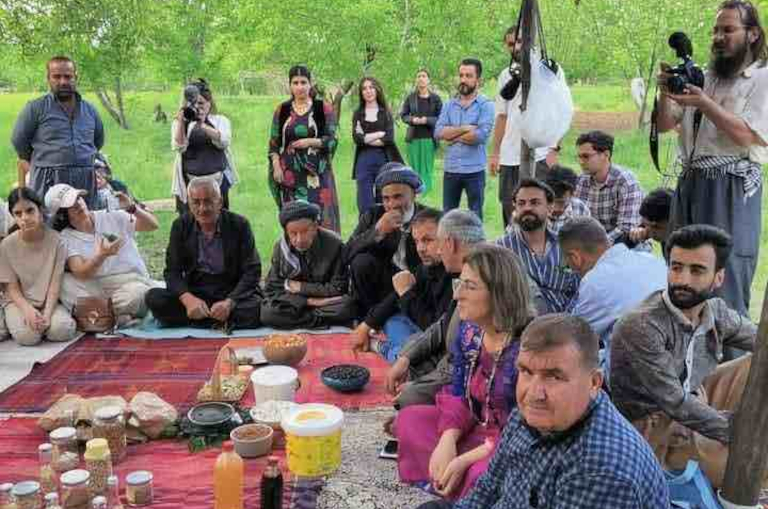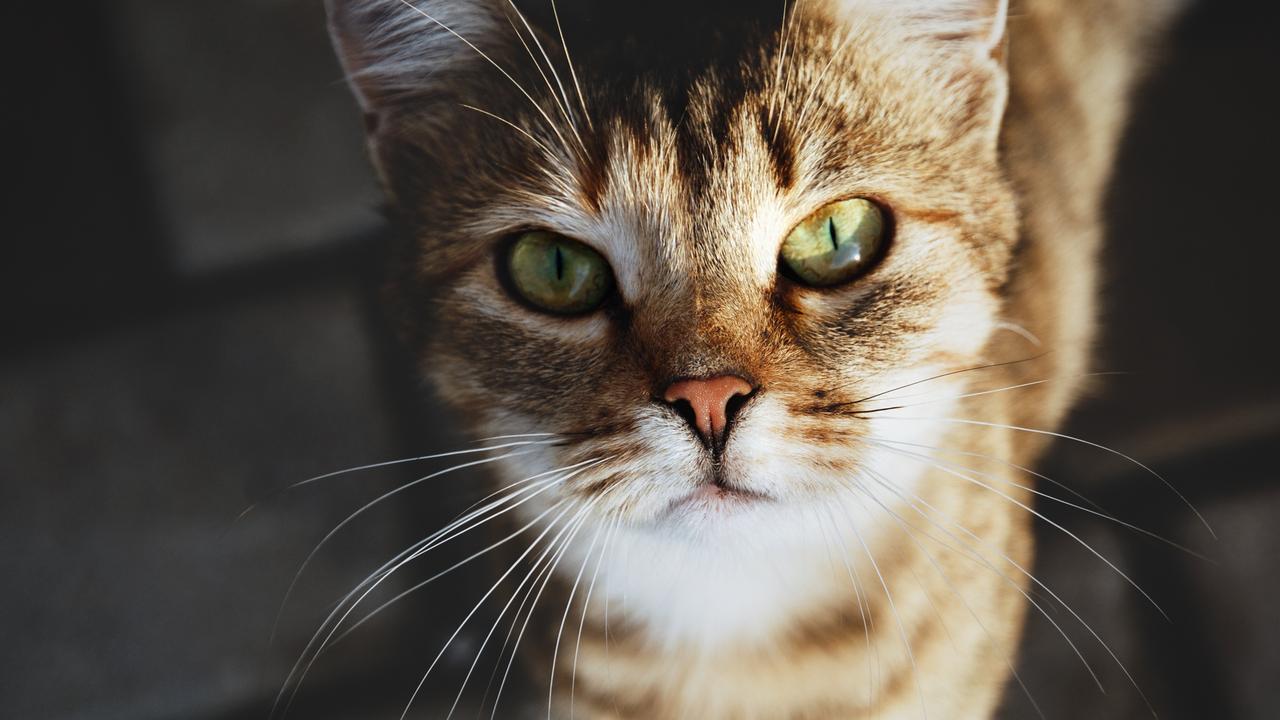Copyright Resilience

Farming in the mountains and plains of Kurdistan has always been more than a way to feed families; it is a way of life, a form of resistance, a connection to land holding deep memory. Long before industrial agriculture and state borders divided the region, Kurdish women cultivated a system of care that nourished both people and nature. Today, following decades of colonization, war, and environmental destruction, communities of Southern Kurdistan are reclaiming that legacy through an agroecology movement that links food sovereignty with freedom, Azadî. One expression of this movement is the work of the Slemani-based Azadbun Organization, which has been exposing ecological and social costs of chemical agriculture. Its awareness campaign and newly published book, both titled ‘The Food You Eat Is Poisoned’, have inspired public discussion of the urgency needed to rebuild sustainable, community-based farming based on Kurdish ecological knowledge. Colonialism, Division, and the Poisoning of the Land The story of Kurdish agriculture cannot be separated from the story of colonization. At the beginning of the 20th century, two consecutive treaties—the Treaty of Sèvres in 1920 and the Treaty of Lausanne in 1923 divided Kurdistan among four modern states: Turkey, Iraq, Iran, and Syria. This partition not only erased political autonomy but also disrupted traditional forms of self-sufficiency. Colonial powers imposed centralized economies and new borders that criminalized cross-border trade and movement. In turn, industrial agriculture supported by foreign governments and corporations began to replace local farming systems. Machinery, chemical fertilizers, and imported seeds were promoted as signs of “modernization.” Yet in practice, they deepened dependency and degraded the environment. Thus, women, once the custodians of seeds, soil, and biodiversity, were driven out of the decision-making process. They were reduced either to wage labor or unpaid labor within a system designed to extract both labor and fertility from land and from women’s bodies alike. This double domination of nature and women is what ecofeminism identifies as the root of today’s global ecological crisis. As Vandana Shiva reminds us, “The violence of development and growth is connected to the violence against women.” Here, ‘poisoning of food’ carries both the literal and symbolic meanings: an ecological wound and a colonial legacy. Women, Land, and Ecological Memory For millennia, Kurdish women were the heart of agriculture in their communities. They saved seeds, knew what plants were good for healing, and collectively organized farming practices to balance production with care. Their agricultural knowledge was not simply technical; it was thoroughly cultural, spiritual, and ecological. In Kurdish society, this connection between women and the land was rooted in generations of lived experience. It was learned and passed on from generation to generation as an ecological ethic shared by the community. Their long history of knowledge and responsibility demonstrates how community survival and environmental care were one and the same. Seen from this perspective, healing the land is also healing the community. Rebuilding agroecology in Kurdistan therefore becomes a decolonial act: a way of reclaiming knowledge, identity, and autonomy from systems that have sought to erase them. Azadbun and The Food You Eat Is Poisoned Campaign In 2024, the Azadbun Organization conducted an awareness campaign under the slogan ‘The Food You Eat Is Poisoned’. The beginning point of the campaign was a very simple and unsettling message: much of the food consumed in the Kurdistan Region today is contaminated—chemically, economically, and politically. The campaign exposed how chemical fertilizers, pesticides, and genetically modified crops have become pervasive in the region’s farming systems. Decades of unregulated imports and profit-driven agricultural policies have left soils depleted, rivers polluted, and farmers trapped in cycles of debt, while consumers are facing increasing rates of cancer, hormonal disorders, and other chronic diseases linked to food toxicity. But Azadbun sought not only to expose such harms but also to point out alternatives. It brought farmers, students, and local communities together to discuss the principles of ecological farming, natural pest control, and local seed revival. It encouraged people to see food not as a commodity but as a shared cultural and ecological responsibility. After the campaign, Azadbun collected the articles, testimonies, and studies into a book titled ‘The Food You Eat Is Poisoned’, which is now used in seminars throughout the Kurdistan Region. The book has become both an educational resource and a rallying point for a growing agroecology movement. These public seminars, held in Slemani and surrounding districts, bring farmers and residents together to share experiences with land degradation, seed loss, and food insecurity, but also point out stories of resilience: farmers returning to organic practices, women with their community gardens, and young activists who link environmental justice with social freedom. Thus, the campaign has turned awareness into action in a collective manner, filling up the gap between critique and practice. Agroecology as Resistance The work of Azadbun thus resonates with global movements for food sovereignty and environmental justice. Agroecology, as practiced by Kurdish communities, is not just a matter of sustainable farming techniques but of reclaiming autonomy over the most basic elements of life: food, water, and land. As one local farmer put it during a workshop: “When we stop buying seeds from corporations, we start freeing ourselves from dependency. When we protect the soil, we protect our own bodies.” This philosophy echoes the insights of ecofeminists such as Maria Mies, who maintained that capitalist patriarchy relies on invisible, unremunerated, and exploited labor-both from women and from the Earth. In the Kurdish context, these dynamics are further exacerbated through ongoing militarization and occupation, which weaponize ecological destruction to quell movements of autonomy. Yet in the midst of these pressures, the Kurdish ecological movement grows: in local seed-exchange initiatives; organic farming cooperatives; community-led environmental education. These are all pieces in a holistic vision: that true freedom-Azadî-must include freedom for Earth. Reconnecting Food, Freedom, and Future Industrial agriculture claims to feed the world, yet it has destroyed 75% of natural resources while producing just about 25% of the world’s food. It displaces small farmers, erases biodiversity, and locks entire societies into globalized systems of dependency. By contrast, agroecology, informed by local knowledge and collective responsibility, builds abundance through diversity. It restores soil health, revitalizes rural economies, and strengthens cultural identity. In Kurdistan, this movement holds a deeper significance: an act of survival on landscapes scarred by political division and ecological exploitation. It is through agroecology that Kurdish communities are reclaiming not only the regeneration of land but also the right to exist on their own terms. Azadbun’s campaign, and the book, and community projects invariably prove that this change starts with an awareness that must be cultivated further in practice. Every organic field is a part of the vast struggle for justice, every revived seed, every meal shared. A Call for International Solidarity The challenges here in Kurdistan—chemical dependency, land dispossession, water theft—are not unique. They are symptoms of a global food system built on inequality and exploitation. But the responses emerging here — community education, women-led agro-ecology, and local autonomy — offer lessons for the world. Linking Kurdish struggles to global movements for food sovereignty, we build bridges of solidarity across borders. The call of ‘The Food You Eat Is Poisoned’ brings us to realize that we are all touched by the same industrial system — and healing must be collective. Azadbun collaborates with anyone who wants to learn, support local efforts, or share their knowledge. And in the words of the Kurdish proverb: ‘The seed of freedom grows only in shared soil‘. Teaser image credit: Author supplied.



